2020春沪教牛津五年级英语下册教学资料- Module 4 知识清单
Module4各单元知识梳理-五年级英语下学期(牛津上海版试用本)
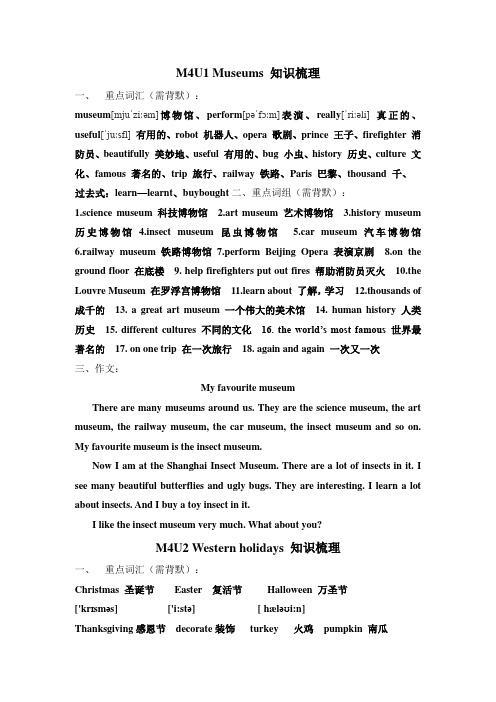
M4U1 Museums 知识梳理一、重点词汇(需背默):museum[mjuˈziːəm]博物馆、perform[pəˈfɔːm]表演、really[ˈriːəli]真正的、useful[ˈjuːsfl]有用的、robot 机器人、opera 歌剧、prince 王子、firefighter 消防员、beautifully 美妙地、useful 有用的、bug 小虫、history 历史、culture 文化、famous 著名的、trip 旅行、railway 铁路、Paris 巴黎、thousand 千、过去式:learn—learnt、buybought二、重点词组(需背默):1.science museum 科技博物馆2.art museum 艺术博物馆3.history museum 历史博物馆4.insect museum 昆虫博物馆5.car museum 汽车博物馆6.railway museum 铁路博物馆7.perform Beijing Opera 表演京剧8.on the ground floor 在底楼9. help firefighters put out fires 帮助消防员灭火10.the Louvre Museum 在罗浮宫博物馆11.learn about 了解,学习12.thousands of 成千的13. a great art museum 一个伟大的美术馆14. human history 人类历史15. different cultures 不同的文化16. the world’s most famous 世界最著名的17. on one trip 在一次旅行18. again and again 一次又一次三、作文:My favourite museumThere are many museums around us. They are the science museum, the art museum, the railway museum, the car museum, the insect museum and so on. My favourite museum is the insect museum.Now I am at the Shanghai Insect Museum. There are a lot of insects in it. I see many beautiful butterflies and ugly bugs. They are interesting. I learn a lot about insects. And I buy a toy insect in it.I like the insect museum very much. What about you?M4U2 Western holidays 知识梳理一、重点词汇(需背默):Christmas 圣诞节Easter 复活节Halloween 万圣节['krɪsməs] ['i:stə] [ hæləʊi:n]Thanksgiving感恩节decorate装饰turkey 火鸡pumpkin 南瓜[,θæŋks'gɪvɪŋ]['dɛkə,reɪt] ['tɝ:kɪ] ['pʌmpkɪn]western 西方的ja cko’lantern 南瓜灯['westən] [dʒæk əu 'læntən]二、重点词组(需背默):on this holiday 在这个节日、Easter egg 复活蛋、Easter egg hunts 寻找复活节彩蛋、on a Sunday in March or April 在三月或四月的一个周日、eat chocolate eggs 吃巧可力蛋、on the 31st of October 在十月三十一日、make jacko’lanterns 做鬼火灯笼、go trickortreating 不给糖就捣乱、eat pumpkin pies and pumpkin bread 吃南瓜派和南瓜面包、on the fourth Thursday of November 在十一月的第四个周四、have a family dinner 进行家庭聚餐、eat turkey and pumpkin pies 吃火鸡和南瓜饼、on the 25th of December 在十二月二十五日、decorate a Christmas tree 装扮圣诞树、give presents to each other彼此赠送礼物、Dragon Boat Festival 端午节、Chinese festival 中国节日、Western holidays 西方节日、make pumpkin pies 做南瓜派、have ‘fancydress’ parties 举行化装舞会、dress like animals 打扮成动物样子、play a trick on them 戏弄他们三、重点句型(需背默):1.Everyone in the UK likes Christmas.在美国每个人都喜欢圣诞节。
2020春沪教牛津五年级英语下册教学资料- Module 4 知识清单
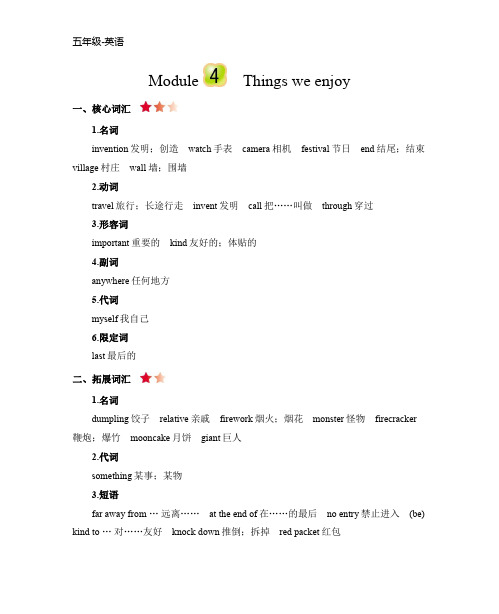
Module Things we enjoy一、核心词汇1.名词invention发明;创造watch手表camera相机festival节日end结尾;结束village村庄wall墙;围墙2.动词travel旅行;长途行走invent发明call把……叫做through穿过3.形容词important重要的kind友好的;体贴的4.副词anywhere任何地方5.代词myself我自己6.限定词last最后的二、拓展词汇1.名词dumpling饺子relative亲戚firework烟火;烟花monster怪物firecracker 鞭炮;爆竹mooncake月饼giant巨人2.代词something某事;某物3.短语far away from …远离……at the end of在……的最后no entry禁止进入(be) kind to …对……友好knock down推倒;拆掉red packet红包三、拓展句型1.I think paper is a great invention. 我认为纸是一项伟大的发明。
解读: 这是一个宾语从句,即作宾语的是一个含有主谓语的句子。
think意思是“思考;认为”,后面可以直接跟宾语,此句中“paper is a great invention”就是think的宾语。
2.People can tell the time anywhere. 人们可以随时随地知道时间。
解读: 这是一个含有情态动词can的陈述句,情态动词can意思是“能;会;可以”,后面跟动词原形,没有人称和数的变化。
3.The Spring Festival comes in January or February every year. 春节在每年一月或二月。
解读: 这是描述某节日在每年某时间的句型。
come in表示“时间在某月份”。
every year是“每一年”的意思。
4.They often eat fish and dumplings. 他们经常吃鱼和饺子。
沪教版五年级下册英语Unit4 Reading is fun

Unit 4 Reading is fun 一、基本知识点(一)词汇storybook [ˈstɔ:ribʊk] n. 故事书buy [baɪ] v. 买story [ˈstɔ:ri] n. 故事dictionary [ˈdɪkʃənri] n. 字典magazine [ˌmægəˈzi:n] n. 杂志newspaper [ˈnju:zpeɪpə(r)] n. 报纸week [wi:k] n. 周;星期student [ˈstju:dnt] n. 学生poster [ˈpəʊstə(r)] n. 海报best [best] adj. 最好的writer [ˈraɪtə(r)] n. 作家(二)短语over there 在那边do a survey 做调查act…out 表演in the future 在将来read storybooks 读故事书make posters 制海报Book Week 读书周(三)句型:I’m going to read a story every day.Is he/she going to buy…? Yes, he/she is. No, he/she isn’t.What is your favourite book? My favourite book is…What is the book about? It’s about…Why do you like it? I like it because…Where’s…? He’s/She’s on the first floor.(四)重难点、易错点:1.Be going to + 动词原形表达某人打算做某事2. 名词变复数 (story——stories dictionary—-dictionaries)3. 复习词汇 fun, beautiful, visit, make等二、典型例题1.I am going _______ a story every day.A. readB. to readC. reading2. —Do you like this picture book?—_______, I don’t.A. YesB. NoC. And3. The students in _______ 4A are having PE.A. GlassB.ClassC.Grass4. Book Week is _______!eB. comingC. comes三、变式习题基础题(一)词汇故事书 ____________杂志 ____________周,星期 ____________字典 ____________(二)补全单词并翻译汉语学生 ____________st_r_ ()b_y ()n_wsp_per ()b_st ()w_iter ()提高题(一)单项选择(1)My father puts the cards _______ a line.A. inB. forC. to (2)He _______, “These are mine”.A. saysB. sayC. saying (3)Miss Li _______ making a poster.A. isB. amC. are (4) _______ they going to take photos?A. areB. AreC. Is (5)— _______ do you like it?—Because it’s fun.A. WhyB. WhatC. How(二)根据实际情况写答语(1)What’s your favorite book?_________________________________(2) What’s the book about?_________________________________(3) Why do you like it?_________________________________强化题(一)连词成句(1)going watch to TV I dinner am after (.)_____________________________________________(2) want poster make for our a I to club (.)_____________________________________________(3) China going in visit places different Kim is to (.)_____________________________________________(4) stand boys smile in the line a and (.)_____________________________________________(5) Mr Xu favorite survey a about films is students’ doing (.)_____________________________________________(二)阅读短文,判断句子正误,填入T(正确)或F(错误)There are forty students in my class. Here is a survey about “Reading Books”. Many students like reading books. They always read them from Mondays to Fridays. They say,“Reading is fun”.Some students don’t like reading books. They say, “It’s boring to read books.” For a student, it is bad to watch TV often. It’s good to read some books.( )1. There are fifty students in my class.( )2. Many students like reading books.( )3. Some students don’t like reading books.( )4. It is good for a student to watch TV often.( )5. Many students say, “Reading is fun”.(二)写作学会用英语说说自己周末喜欢做的事My favorite book is __________ . It’s about __________ .I like it because __________ .。
沪教牛津版五年级英语下册Module4模块知识梳理卷含答案

沪教牛津版五年级英语下册Module 4模块知识梳理卷时间:30分钟满分:100分一、重点单词。
(英汉互译)(24分)1. 发明;创造______________2. 手表______________________3. 任何地方_________________4. 旅行;长途行走____________5. 我自己___________________6. 相机______________________7. 节日_____________________ 8. 重要的____________________9. 把……叫作_______________ 10. 结尾;结束_______________11. 村庄____________________ 12. 最后的___________________13. 墙;围墙________________ 14. 友好的;体贴的___________15. 穿过____________________ 16. something_________________17. dumpling_________________ 18. relative____________________19. firework__________________ 20. monster___________________21. firecracker_________________ 22. mooncake__________________23. giant_____________________ 24. invent_____________________二、按要求写出下列单词。
(24分)1. come(现在分词)____________________2. sound(复数)________________________3. hear(第三人称单数) _________________4. go(第三人称单数)___________________5. live(第三人称单数) __________________6. run(第三人称单数)___________________7. say(第三人称单数) __________________8. build(第三人称单数)_________________9. watch(现在分词) ____________________10. fly(现在分词) ______________________11. packet(复数) _______________________12. dumpling(复数)______________________三、重点短语。
五年级下册英语-unit4 reading is fun 知识点总结 牛津上海版

U4知识点:一:U4听写内容:单词: buy/ student/ week/ weekend/ weekdays/ writer/ favourite/favorite.dictionary:We can learn new words from it. 复数:dictionaries newspaper:We can get news from it. 复数:newspapers magazine:We can get more information from it. 复数:magazines picture book:We can enjoy many pictures from it.storybook: We can read interesting stories from it.短语:many storybooks/ look at the pictures/ over there(在那里),many beautiful pictures/ pictures of different places in China(中国各地照片)/ visit these(those)place/ Stories for Children(孩子们的故事,书名要大写)/ read a story everyday/ look up in the dictionary(查字典)/ music and art books/ read a magazine/ read a newspaper(可数名词)/ make posters about…/take some photos of…./do a survey about…(做关于…的调查)/ read a play(读剧本)/ act…out(表演)/ the ground floor (英式一楼)/ the first floor (美式一楼).句子:I’m going to read a story every day.Are you going to read a story every day? Yes, I am. No, I’m not.Is he/ she going to read a story every day? Yes, he/she is.No, he /she isn’t.二:U4作文模板:1:书店买书Peter, Joe, Kitty and I are in a bookshop. We are going to buy storybooks,dictionaries, magazines and picture books.Peter is going to the fourth floor and buy an art book. He is going to make a poster about the Book Week. Joe is going to the third floor and buy a dictionary. He is going to write about some writers of the stories. Kitty is going to the second floor and buy a storybook. She is going to write a reading card for the Book Week. She is going to read a story every day. I’m going to the ground floor and buy a magazine. I’m going to take some photos of the book. We will have a wonderful day!2:介绍一本自己喜欢的书I like reading because reading is fun. I like reading Cinderella. The book is about a poor girl and her stepmother. I like it because there are many beautiful pictures in it. It’s very interesting.三:be going to 口诀be going to,表打算,准备,计划近期。
完整word版牛津英语五年级下册知识点整理

牛津英语上海版五年级下册知识点整理Module1 Using my five sensesUnit1 What a mess生词:notebook paints crayon school bag tape glue brush音标:语法:Whose...? It's mine/yours/his/hers/ours/theirs. They're...Unit2 Watch it grow 生词:dogpuppy duck butterfly chick chicken duckling caterpillar语法:...was/were...Unit3 How noisy 生词:motorbike bus car drill lorry音标:?? ///??/ suretoy boy oy ure our enjoy joytour oor join oi noisepoor pointtoilet语法:...did...牛津英语上海版五年级下册知识点整理Module2 My favorite thingsUnit1 Food and drinks生词:Meat: pork beef chicken fishVegetables: tomatoes potatoes carrots cabbages beansFruit: apples oranges bananas grapesStaple Food: rice noodles breadDrinks: juice water milk tea语法:What did you have for...? I had...FilmUnit2生词:seat ticket ticket office entrance exit语法:Shall we...Unit3 school subject 生词:Music Maths Chinese English Art IT PE牛津英语上海版五年级下册知识点整理Module3 Things around usUnit1 Signs生词:telephone toilet restaurant exit entranceNo smoking No swimming Don't litter Don't walk on the grass音标:/r//l/ redl radio like late r grassblack grow blouse语法:What does this sign say/mean? It says/means wecan/can't/mustn't/shouldn't..Unit2 Weather 生词:rain/rainy wind/windy Cloud/cloudy sun/sunny ℃/thirty degrees 30snow/snowy storm/stormy fog/foggy音标:/e/ θ/ / these think th they ththird father mouth mother month语法:What's the weather like? What's the temperature?It's...(weather).It's...(temperature).Unit3 Changes 生词:sofa cushion bed mirror lamp bookshelf Cupboard语法:What can we do?牛津英语上海版五年级下册知识点整理Module4 More things to learnUnit1 Museum生词:Science museum art museum history museumInsect museum car museum railway museum语法:Which museum do you want to visit?I want to visit ...Why?Because...Unit2 Western holiday生词:Christmas Easter Halloween Thanksgiving 语法:When is ...? It's on ... What do people do on this holiday?Unit3 story time 生词:castle giant。
2020春沪教牛津五年级英语下册全册知识清单
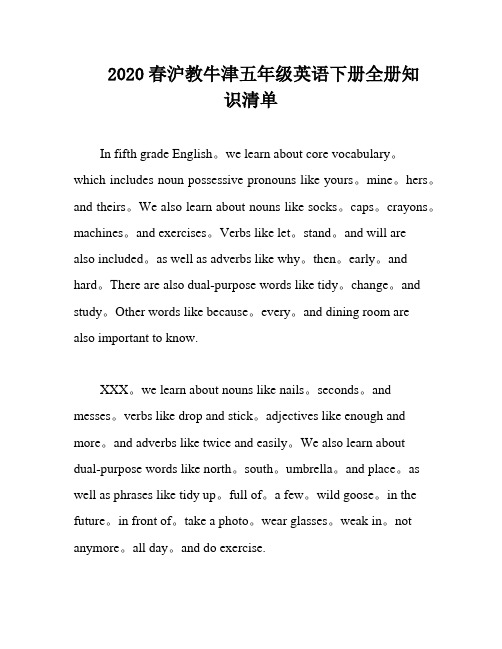
2020春沪教牛津五年级英语下册全册知识清单In fifth grade English。
we learn about core vocabulary。
which includes noun possessive pronouns like yours。
mine。
hers。
and theirs。
We also learn about nouns like socks。
caps。
crayons。
machines。
and exercises。
Verbs like let。
stand。
and will arealso included。
as well as adverbs like why。
then。
early。
and hard。
There are also dual-purpose words like tidy。
change。
and study。
Other words like because。
every。
and dining room are also important to know.XXX。
we learn about nouns like nails。
seconds。
and messes。
verbs like drop and stick。
adjectives like enough and more。
and adverbs like twice and easily。
We also learn aboutdual-purpose words like north。
south。
umbrella。
and place。
as well as phrases like tidy up。
full of。
a few。
wild goose。
in the future。
in front of。
take a photo。
wear glasses。
weak in。
not anymore。
all day。
and do exercise.XXX。
上海牛津版英语五年级下册Module4Unit3M4U3同步讲义教案

学员编号:年级学员姓名:辅导科目(:五年级课时数:英语学科教师:授课类型T Module 4 Unit3 (牛津 5 下)基础知识梳理教学目标1、使学生能够基本掌握牛津5年级下册ModUle 4 Unit1 中的基础词汇及重要句型;2、使学生掌握现在完成时的基本用法和解题技巧;3、提高学生通过句子成分和词性解首字母填空题的能力。
星级★★★授课日期及时段T同步-U3基础知识梳理批注:《海底总动员》是一部由迪士尼公司推出的三维电脑动画作品。
主角是一对可爱的小丑鱼父子,父亲玛林和儿子尼莫。
在澳洲大堡礁温暖的海水里,小丑鱼玛林和儿子尼莫生活在安逸而隐蔽的海底,一天,一直向往到海洋中冒险的尼莫,游出了他们所居住的珊瑚礁。
却被渔夫捞走并卖到了悉尼当了人类的玩物。
为了救回心爱的孩子,本来胆小怕事的玛林决心跟上澳洲洋流,踏上寻找自己儿子的漫漫征程。
一路上玛林遇到了很多形形色色的朋友,也遭遇了各式各样的危机。
最终救回了自己的儿子。
这是一个非常有趣的故事,想要知道更多的故事吗?紧接着引出Unit3的主题-Story time批注:上边两幅图分别为 giant 和castle.老师需要引导学生默写出这两个单词,同时根据学生程度的不同交 给孩子记单词的方法和技巧,让课堂充满生命力和活力。
批注:上边两幅图分别为flowers 和garden.老师需要引导学生默写出这两个单词,同时根据学生程度的不同 交给孩子记单词的方法和技巧。
让课堂充满活力和趣味性。
(建议20-25分钟) Ready, go!!J、词汇WOrdSΦ3. ________________、重要句型ImPOrtant SentenCeS StrUCtUreS1. She brings beautiful flowers and birds.意思:她带来了美丽的花和鸟。
bring:带来take:带去Eg: my father brings ple nty of PreSe nts for me.PIeaSe take these flowers to my home.批注:让学生区分take和bring的意思和用法2. The gia nt comes back and SeeS the ChiIdre n.意思:这个巨人返回来,看到了这些孩子。
沪教牛津版五年级英语下册各单元知识清单
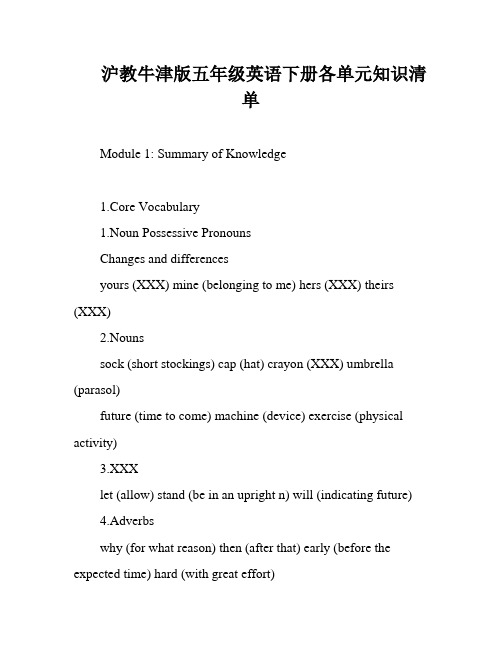
沪教牛津版五年级英语下册各单元知识清单Module 1: Summary of Knowledge1.Core Vocabulary1.Noun Possessive PronounsChanges and differencesyours (XXX) mine (belonging to me) hers (XXX) theirs (XXX)2.Nounssock (short stockings) cap (hat) crayon (XXX) umbrella (parasol)future (time to come) machine (device) exercise (physical activity)3.XXXlet (allow) stand (be in an upright n) will (indicating future)4.Adverbswhy (for what reason) then (after that) early (before the expected time) hard (with great effort)5.n Wordstidy (neat and organized) change (make or e different) study (room for learning)6.XXXbecause (for the reason that) every (each and all)7.Phrasesdining room (room for eating)2.XXX1.Nounsnail (metal pin) second (unit of time) mess (disorder)2.XXXdrop (let fall) stick (attach)3.Adjectivesenough (sufficient) more (a greater amount)4.Adverbstwice (two times) easily (with ease)5.n WordsXXX) XXX)6.Phrasestidy up (organize) be full of (filled with) a few (several) wild goose (plural: wild geese) in the future (time to come) in front of (before) take a photo (photograph) wear glasses (use eyeglasses) weak in (not skilled in) not。
新沪教牛津版五年级下册小学英语全册单元知识点小结
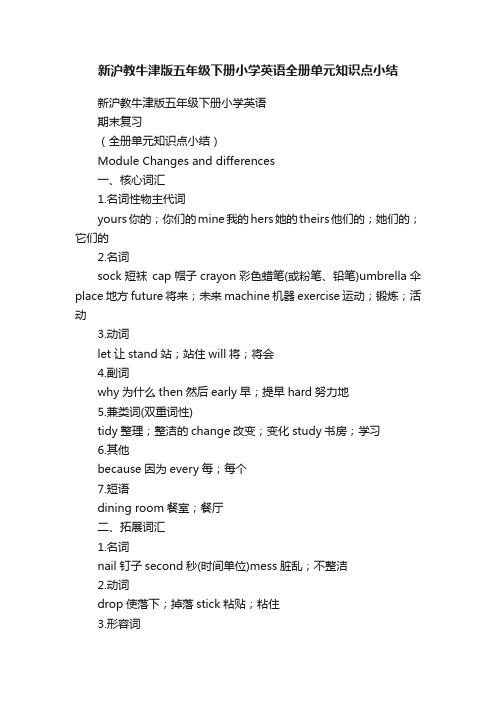
新沪教牛津版五年级下册小学英语全册单元知识点小结新沪教牛津版五年级下册小学英语期末复习(全册单元知识点小结)Module Changes and differences一、核心词汇1.名词性物主代词yours你的;你们的mine我的hers她的theirs他们的;她们的;它们的2.名词sock短袜cap帽子crayon彩色蜡笔(或粉笔、铅笔)umbrella伞place地方future将来;未来machine机器exercise运动;锻炼;活动3.动词let让stand站;站住will将;将会4.副词why为什么then然后early早;提早hard努力地5.兼类词(双重词性)tidy整理;整洁的change改变;变化study书房;学习6.其他because因为every每;每个7.短语dining room餐室;餐厅二、拓展词汇1.名词nail钉子second秒(时间单位)mess脏乱;不整洁2.动词drop使落下;掉落stick粘贴;粘住3.形容词enough足够的more更多的4.副词twice两次easily容易地5.兼类词(双重词性)north北方;向北south南方;向南6.短语tidy up把……整理好(be) full of装满……;充满…… a few几个;一些wild goose大雁(复数wild geese) in the future将来in front of 在……前面take a photo拍照wear glasses戴眼镜(be)weak in不擅长not … any more不再all day 一天到晚do exercise做运动三、核心句型1.— Are they yours?它们是你的?— No,they aren’t. 不,它们不是。
解读: 问句是一个一般疑问句,用来询问某物的归属,有肯定和否定两种回答。
举一反三: — Are these crayons yours?这些蜡笔是你的吗?— No,they aren’t. 不,它们不是。
牛津沪教版小学英语五年级下册知识点总结.doc

牛津沪教版小学英语五年级下册知识点总结.doc牛津沪教版小学英语五年级下册知识点总结沪教版五年级英语下册(上海牛津5B) 知识点总结知识点总结动词的方法:一、动词后边加上 ing :①、现在进行时:表明某个动作正在产生或进行。
它的构成方法是:主语+be+动词ing 〔现在分词〕形式,有时会要求自己加上be 动词(is, am , are )。
语句中常常会呈现look, listen,now ??等词。
现在进行时的改变肯定句式:主语+be( am, is, are)+动词ing+ 其它.否定句式:主语+be(am, is, are) + not +动词ing+ 其它.一般疑问句:Be(am, is, are) + 主语+动词ing + 其它?特殊疑问句:疑问词(what , where ?)+be(am, is, are)+ 主语+动词ing + 其它?对现在进行时的特别疑问句的答复,它不可以用Yes 或No 直接作答,要依据实际情况答复。
练习:1. What are you _________(do)now? I ___________(eat) bread.2. It ’s nine o ’clocyk.f.aMther_______________(work) in the office.3. Look, the boy____________(put) the plate on his finger.4. __________he__________(clean) the classroom? No, heisn ’t.He____________(play).5. Where is Mak? He___________(run) on the grass.6. Listen, who___________(sing) in the music room? Oh,Mary___________(sing)there.②like(s), go ,do some , 后面的动词加ing.如:1. I like (play ) football, but my father likes (play) chess.2.Let ’s go (swim).二、动词后边加 s/es.这就有关一种时态:一般现在时。
上海牛津版英语五年级下册Module4Unit2M4U2同步讲义教案

3
意思:我们相互之间给礼物。 give sth to sb =give sb sth
offer sb sth =offer sth to sb 批注:each other :互相 两者之间
one another:互相 三者或三者以上
批注: Christmas is coming soon,很多小朋友都会对圣诞节充满了期待,但是学生们可能对圣诞节本身并不是很 了解。通过课前的一点阅读,让学生了解到关于圣诞的一些常识,甚至可以给到学生一点小小的 surprise,增 进师生之间的情感,对老师的课堂也会更有兴趣。
(建议 20-25 分钟)
一、词汇 Words
1._______________
2.______________
批注:上边两幅图片为 Christmas 和 Easter . 老师需要引导学生填出所空缺的单词,其次根据每个学生的不 同程度交给学生记单词的方法和技巧。
2
3.____________
4._____________
5
hide :藏 隐藏。 现在分词:hiding, 三单:hides 过去式:hid. 批注:a lot of=lots of :许多 后边即可接可数名词也可接不可数名词 plenty of:大量的。 和 a lot of 的用法是一样的,即可接可数也可接不可数。
4.But these ones are different. 意思:但是这些是不同的。 Ones 代指前边提到的可数名词复数,one 代指前边提到的可数名词单数。 批注:注意要让学生区分 one 和 ones 的区别以及特殊用法
(建议 5-10 分钟)
五年级下册牛津英语M4知识点

Module4知识点汇总Vocabulary词汇一类词汇(要求:会读、知晓词意、会造句表达、会听写) museum science art history insect car railway which visit ugly bug learn western holiday important festival present decorate wait for country special travel moment turkey pumpkin pie Christmas Thanksgiving giant castle put up shout from then on arrive break down useful二类词汇(要求:会读、知晓词意、会造句表达)robot perform Beijing Opera put out find the ground floor human culture thousands of famous trip The Louvre Museum laugh at each other Christmas Eve bright still Dragon Boat Festival online chat with interesting firefighter Paris forever and ever last year sleigh a way to...everywhere again make thank-you cards一、重点句子(要求:会读、知晓句意、会替换造句、尝试背诵)1.Which museum do you want to visit?I want to visit the Railway Museum.2.Those robots can help firefighters put out fires.They’re very useful.3.These robots can perform Beijing Opera.They’re dancing beautifully.4.There were beautiful butterflies and ugly bugs.I learnt a lot about insects.5.Where can I see the cars?On the ground floor.6.People can learn about human history and many different cultures.7.There are thousands of paintings in the Louvre Museum.8.When is Christmas?It’s on the25th of December.9.It is an important festival in many Western countries.10.What do people do on this holiday?People usually give presents to each other.11.They also like to decorate a tree and put it up in their homes.12.It is a special holiday.People often travel far to be with their families.13.They usually eat turkey and pumpkin pie at the Thanksgiving meal.14.They also talk about their favourite moments of the last year.15.Kitty is chatting online with her friend Laura.16.Do you make thank-you cards on that day?Yes.That’s a great way to give thanks.17.He did not like it because his friends laughted at him.18.The weather was bad.Father Christmas could not find his way.19.Long long ago,a giant lived in the castle.20.‘Get out!’he shouted.The children were afraid and ran away.21.The giant built a tall wall around the garden and put up a sign.22.Miss Spring arrived.She brought beautiful flowers and birds.23.Let me break down the wall.You can play in my garden forever and ever.二、语法知识点(要求:理解并运用)1.具体日期表达:the+序数词+of+月份如:the25th of December(12月25日)月份表达:January February March April May June July 一月二月三月四月五月六月七月August September October November December八月九月十月十一月十二月2.常见中国节日the Spring Festival春节the Lantern Festival元宵节the Dragon Boat Festival端午节the Mid-Autumn Festival中秋节the Double Ninth Festival重阳节National Day国庆节International Labour Day国际劳动节3.本模块动词过去式积累buy-bought go-went learn-learnt see-saw laugh-laughed help-helped can-could take-took love-loved live-lived say-said come-came play-played shout-shouted run-ran build-built put-put arrive-arrived bring-brought look-looked feel-felt stay-stayed hear-heard smell-smelt think-thought三、口语交际(要求:能根据实际情况替换表达)1.A:When’s Christmas?B:It’s on the25th of December.A:What do people do on this holiday?B:People decorate their houses and have a special dinner with their families.2.A:Which museum do you want to visit?B:I want to visit the Art Museum.A:Why?B:Because I can see many paintings and learn a lot about art.。
上海牛津版英语五年级下册Module1-Module4M1-M4期末总复习

学员编号:年级:五课时数:3 学员姓名:辅导科目:英语学科教师: XX授课类型T 五年级下重点词汇总复习(牛津版)星级★★★教学目标1、使孩子能够对所学的词汇熟练的掌握,并学会如何运用;2、培养孩子良好的解题习惯和解题技巧。
(建议2-5分钟)Rory: Time me. I’m going to do this cube puzzle.Rory: Are you timing me?Stan: March 6, 2009. Go.(批注:欣赏小漫画,猜猜单词的含义:time: 计时;cube: 立方体puzzle: 难题cube puzzle: 【魔方】(建议20-25分钟)T同步-五年级下重点词汇总复习1一、词汇Words1. 核心词汇书架bookshelf 镜子mirror 靠垫cushion 橱柜cupboard 床bed 灯lamp 沙发sofa 家具furniture 下一个的next 移动move 窗户window 墙wall批注:这些单词分别为本学期重点名词,要求学生能够熟练掌握,并学会举一反三。
2. 其他词汇变化change 惊喜surprise 不同的different 惊讶的surprised在...之后behind 等wait 记住remember 以前ago乡村village 渔民fisherman 后来later 地方place城镇town 城市city 建筑building 国家country上海历史博物馆Shanghai History Museum批注:这些单词分别为本学期重点动词,名词或其它词性。
要求学生能够熟练掌握,并学会举一反三。
3. 词汇解析1)bookshelf(书架) 和cupboard(橱柜)都是复合词,分别由book(书)和shelf(架子),cup(杯子)和board(木板)组成。
2)furniture是不可数名词,意思是“家具”批注:bed(床),table(桌子),desk(书桌),chair(椅子),sofa(沙发),cupboard(橱柜),bookshelf(书架)等。
沪教牛津版(深圳用)五年级英语下册Module4Unit12Thegiant'sgarden

沪教牛津版(深圳用)五年级英语下册Unit 12 The giant's garden巨人的花园知识梳理语块整体记忆习惯搭配/短语:1. live in居住2. in the garden在花园里3. a lot of...许多4. (be) kind to...对......友好5. bring...to...把......带到惯用语:Get out!出去!句型框架:1. Children like to...2. The children cannot...3. She brings...4. It is always...必会词汇giant巨人;转化giant adj.巨大的;巧记gi+ant(蚂蚁)=giant(巨人)例句They're afraid of the giant.他们害怕巨人。
wall墙;围墙;形近ball球,tall高的;转化wall v.用墙把......围住短语on the wall 在墙上,the Great Wall长城;联想door门巧记w+all(所有的)=wall(墙;围墙)例句There is a map on the wall.墙上有一张地图。
no entry禁止进入;例句It says “No entry”.上面写着“禁止进入”。
kind友好的;体贴的;形近find找到,wind风,blind盲的派生kindly adv.友好地;转化kind n.种类短语(be) kind to...对......友好;巧记:一个友好的(kind)人找到(find)了这个盲(blind)人。
例句He's a kind man.他是一个友好的人。
through穿过;形近though尽管例句The path led through the trees to the river.这条小路穿过树林通向河边。
knock down推倒;拆掉例句The house is knocked down.那所房子被拆掉了。
2020春沪教牛津五年级英语下册全册知识清单

五年级五年级 英语英语下 ModuleChanges and differences一、核心词汇1.名词性物主代词yours 你的;你们的你的;你们的 mine 我的我的 hers 她的她的 theirs 他们的;她们的;它们的他们的;她们的;它们的 2.名词sock 短袜短袜 cap 帽子帽子 crayon 彩色蜡笔(或粉笔、铅笔) umbrella 伞 place 地方地方 future 将来;未来将来;未来 machine 机器机器 exercise 运动;锻炼;活动运动;锻炼;活动3.动词let 让 stand 站;站住站;站住 will 将;将会将;将会 4.副词why 为什么为什么 then 然后然后 early 早;提早早;提早 hard 努力地努力地5.兼类词(双重词性)tidy 整理;整洁的整理;整洁的 change 改变;变化改变;变化 study 书房;学习书房;学习 6.其他because 因为因为 every 每;每个每;每个 7.短语dining room 餐室;餐厅餐室;餐厅 二、拓展词汇1.名词nail 钉子钉子 second 秒(时间单位) mess 脏乱;不整洁脏乱;不整洁 2.动词drop 使落下;掉落使落下;掉落 stick 粘贴;粘住粘贴;粘住 3.形容词enough 足够的足够的 more 更多的更多的 4.副词twice 两次两次 easily 容易地容易地 5.兼类词(双重词性)north 北方;向北北方;向北 south 南方;向南南方;向南6.短语tidy up 把……整理好把……整理好 (be) full of 装满……;充满……装满……;充满…… a few 几个;一些几个;一些 wild goose 大雁(复数wild geese) in the future 将来将来 in front of 在……前面在……前面 take a photo 拍照拍照 wear glasses 戴眼镜戴眼镜 (be)weak in 不擅长不擅长 not … any more 不再不再 all day 一天到晚一天到晚 do exercise 做运动做运动 三、核心句型1.— Are they yours?它们是你的?— No , they aren ’t. 不,它们不是。
五年级下册英语素材第四单元知识点复习沪教牛津版
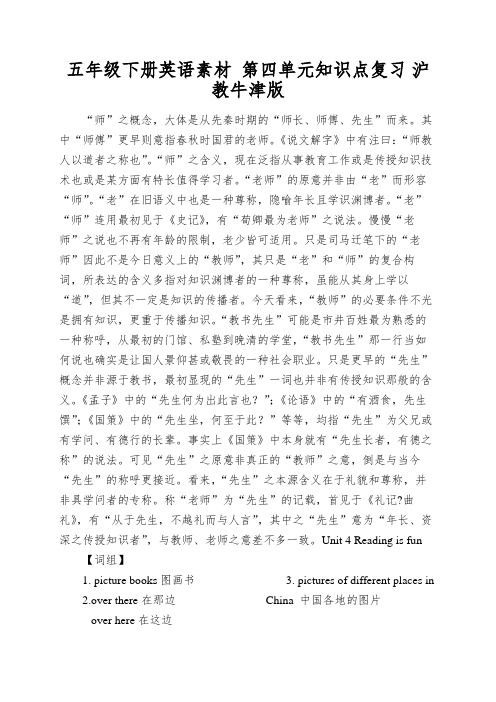
五年级下册英语素材第四单元知识点复习沪教牛津版“师”之概念,大体是从先秦时期的“师长、师傅、先生”而来。
其中“师傅”更早则意指春秋时国君的老师。
《说文解字》中有注曰:“师教人以道者之称也”。
“师”之含义,现在泛指从事教育工作或是传授知识技术也或是某方面有特长值得学习者。
“老师”的原意并非由“老”而形容“师”。
“老”在旧语义中也是一种尊称,隐喻年长且学识渊博者。
“老”“师”连用最初见于《史记》,有“荀卿最为老师”之说法。
慢慢“老师”之说也不再有年龄的限制,老少皆可适用。
只是司马迁笔下的“老师”因此不是今日意义上的“教师”,其只是“老”和“师”的复合构词,所表达的含义多指对知识渊博者的一种尊称,虽能从其身上学以“道”,但其不一定是知识的传播者。
今天看来,“教师”的必要条件不光是拥有知识,更重于传播知识。
“教书先生”可能是市井百姓最为熟悉的一种称呼,从最初的门馆、私塾到晚清的学堂,“教书先生”那一行当如何说也确实是让国人景仰甚或敬畏的一种社会职业。
只是更早的“先生”概念并非源于教书,最初显现的“先生”一词也并非有传授知识那般的含义。
《孟子》中的“先生何为出此言也?”;《论语》中的“有酒食,先生馔”;《国策》中的“先生坐,何至于此?”等等,均指“先生”为父兄或有学问、有德行的长辈。
事实上《国策》中本身就有“先生长者,有德之称”的说法。
可见“先生”之原意非真正的“教师”之意,倒是与当今“先生”的称呼更接近。
看来,“先生”之本源含义在于礼貌和尊称,并非具学问者的专称。
称“老师”为“先生”的记载,首见于《礼记?曲礼》,有“从于先生,不越礼而与人言”,其中之“先生”意为“年长、资深之传授知识者”,与教师、老师之意差不多一致。
Unit 4 Reading is fun 【词组】1. picture books 图画书2.over there 在那边over here 在这边3. pictures of different places in China 中国各地的图片4. Stories fo Children 儿童故事5. read a story = read stories 读故事6.at the bookshop 在书店7. in the library 在图书馆8. Pictures Stories of China 中国故事图画9.Book Week 图书周10. the students in Class 5A 5 A班的学生11. make posters about…制作关于…的海报12. the best stories for children 对小孩来说最好的故事13. write about…写关于…14. take photos of …给…拍照15. do a survey 做调查16. read a play 读剧本17. act … out 表演18. on the ground floor 在一楼(英式) on the first floor 在二楼(英式)on the second floor 在三楼(英式) on the third floor 在四楼(英式)19. read a newspaper = read ne wspapers 看报20. have fun 玩【句型】1. I’m going to read a story every day. 我将每天读一个故事。
- 1、下载文档前请自行甄别文档内容的完整性,平台不提供额外的编辑、内容补充、找答案等附加服务。
- 2、"仅部分预览"的文档,不可在线预览部分如存在完整性等问题,可反馈申请退款(可完整预览的文档不适用该条件!)。
- 3、如文档侵犯您的权益,请联系客服反馈,我们会尽快为您处理(人工客服工作时间:9:00-18:30)。
Module Things we enjoy
一、核心词汇
1.名词
invention发明;创造watch手表camera相机festival节日end结尾;结束village村庄wall墙;围墙
2.动词
travel旅行;长途行走invent发明call把……叫做through穿过
3.形容词
important重要的kind友好的;体贴的
4.副词
anywhere任何地方
5.代词
myself我自己
6.限定词
last最后的
二、拓展词汇
1.名词
dumpling饺子relative亲戚firework烟火;烟花monster怪物firecracker 鞭炮;爆竹mooncake月饼giant巨人
2.代词
something某事;某物
3.短语
far away from …远离……at the end of在……的最后no entry禁止进入(be) kind to …对……友好knock down推倒;拆掉red packet红包
三、拓展句型
1.I think paper is a great invention. 我认为纸是一项伟大的发明。
解读: 这是一个宾语从句,即作宾语的是一个含有主谓语的句子。
think意思是“思考;认为”,后面可以直接跟宾语,此句中“paper is a great invention”就是think的宾语。
2.People can tell the time anywhere. 人们可以随时随地知道时间。
解读: 这是一个含有情态动词can的陈述句,情态动词can意思是“能;会;可以”,后面跟动词原形,没有人称和数的变化。
3.The Spring Festival comes in January or February every year. 春节在每年一月或二月。
解读: 这是描述某节日在每年某时间的句型。
come in表示“时间在某月份”。
every year是“每一年”的意思。
4.They often eat fish and dumplings. 他们经常吃鱼和饺子。
解读: 这是描述某人经常做某事的句型。
often表示“常常;经常”。
在陈述句中,often应当放置在实义动词之前,情态动词、be动词之后。
5.Children like to play in the garden. 孩子们喜欢在花园里玩儿。
解读: 这是描述某人喜欢做某事的句型。
like后面可以接动词不定式,表示喜欢马上去做的事情;也可以接动名词形式,表达一种爱好。
6.Now the children cannot play in the garden. 现在孩子们不能在花园里玩儿了。
解读: 这是描述某人不能做某事的句型。
这是一个否定句。
cannot是情态动词can的否定形式,也可以写成“can’t”。
